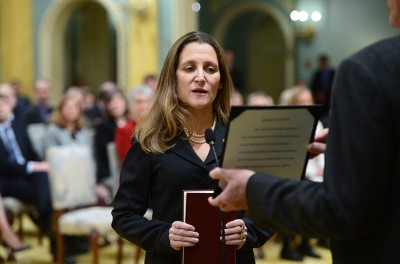Chrystia Freeland: Canada Doesn’t Engage in “Regime Change”
A huge surprise to the people of Libya, Haiti, Honduras, Chile, Democratic Rep. Congo, Ghana, Uganda, Guatemala, and ...

It may walk and quack like a regime-change-promoting duck, but Ottawa’s unilateral sanctions and support for Venezuela’s opposition is actually just a cuddly Canadian beaver, says Chrystia Freeland.
“Canada has never been an imperialist power. It’s even almost funny to say that phrase: we’ve been the colony,” said the journalist turned politician after a Toronto meeting of foreign ministers opposed to the Venezuelan government.
The above declaration was part of the Canadian foreign minister’s response to a question about Chavismo’s continued popularity, which was prefaced by a mention of protesters denouncing Ottawa’s interference in Venezuela’s internal affairs. Freeland added that “one of the strengths Canada brings to its international affairs” is that it doesn’t engage in “regime change”.
Notwithstanding her government’s violation of the UN and Organization of American States charters’ in Venezuela, Freeland’s claim that Ottawa doesn’t engage in “regime change” is laughable. Is she unaware that a Canadian General commanded the NATO force, which included Canadian fighter jets, naval vessels and special forces, that killed Muammar Gaddafi in Libya six years ago?
Sticking to contexts more directly applicable to the situation in Venezuela, Ottawa has repeatedly endorsed US-backed military coups against progressive elected leaders. Canada passively supported the ouster of Iranian Prime Minister Mohammad Mossadegh in 1953, Guatemalan President Jacobo Arbenz in 1954, Ugandan President Milton Obote (by Idi Amin) in 1971 and Chilean President Salvador Allende in 1973.
In a more substantial contribution to undermining electoral democracy, Ottawa backed the Honduran military’s removal of elected president Manuel Zelaya. Before his 2009 ouster Canadian officials criticized Zelaya and afterwards condemned his attempts to return to the country. Failing to suspend its military training program, Canada was also the only major donor to Honduras — the largest recipient of Canadian assistance in Central America — that failed to sever any aid to the military government. Six months after the coup Ottawa endorsed an electoral farce and immediately recognized the new right-wing government.
In the 1960s Ottawa played a more substantial role in the ouster of pan-Africanist independence leaders Kwame Nkrumah and Patrice Lumumba. In 1966 Ghana’s Canadian-trained army overthrew Nkrumah. In an internal memo to External Affairs just after Nkrumah was ousted, Canadian high commissioner in Accra, C.E. McGaughey wrote “a wonderful thing has happened for the West in Ghana and Canada has played a worthy part.” Soon after the coup, Ottawa informed the military junta that Canada intended to carry on normal relations and Canada sent $1.82 million ($15 million today) worth of flour to Ghana.
Ottawa had a strong hand in Patrice Lumumba’s demise. Canadian signals officers oversaw intelligence positions in the UN mission supposed to protect the territorial integrity of the newly independent Congo, but which Washington used to undermine the progressive independence leader. Canadian Colonel Jean Berthiaume assisted Lumumba’s political enemies by helping recapture him. The UN chief of staff, who was kept in place by Ottawa despite being labelled an “imperialist tool” by Lumumba’s advisers, tracked the deposed prime minister and informed army head Joseph Mobutu of Lumumba’s whereabouts. Soon after Lumumba was killed and Canadian officials celebrated the demise of an individual Prime Minister John Diefenbaker privately called a “major threat to Western interests”.
It’s in the Western Hemisphere’s poorest nation where Canada was most aggressive in opposing a progressive government. On January 31 and February 1, 2003, Jean Chrétien’s Liberal government organized an international gathering to discuss overthrowing Haiti’s elected government. No Haitian officials were invited to the “Ottawa Initiative on Haiti” where high-level US, Canadian and French officials decided that president Jean-Bertrand Aristide “must go”, the dreaded army should be recreated and that the country would be put under a Kosovo-like UN trusteeship.
Thirteen months after the “Ottawa Initiative on Haiti” meeting Aristide and most other elected officials were pushed out and a quasi UN trusteeship had begun. The Haitian National Police was also heavily militarized.
Canadian special forces “secured” the airport from which Aristide was bundled (“kidnapped” in his words) onto a plane by US Marines and deposited in the Central African Republic. Five hundred Canadian troops occupied Haiti for the next six months.
After cutting off aid to Haiti’s elected government, Ottawa provided tens of millions of dollars in foreign aid to the installed government, publicly supported coup officials and employed numerous officials within coup government ministries. Haiti’s deputy justice minister for the first 15 months of the foreign-installed government, Philippe Vixamar, was on the Canadian International Development Agency’s payroll and was later replaced by another CIDA employee (the minister was a USAID employee). Paul Martin made the first ever trip by a Canadian prime minister to Haiti to support the violent post-coup dictatorship.
Dismissing criticism of Ottawa’s regime change efforts in Venezuela by claiming Canada has been a benevolent international actor is wholly unconvincing. In fact, a serious look at this country’s foreign policy past gives every reason to believe that Ottawa is seeking to unseat an elected government that has angered many among the corporate set.
Anyone with their eyes open can tell the difference between a beaver and a duck.
Yves Engler is the author of A Propaganda System: How Canada’s Government, Corporations, Media and Academia Sell War and Canada in Africa: 300 years of aid and exploitation. Read other articles by Yves.

